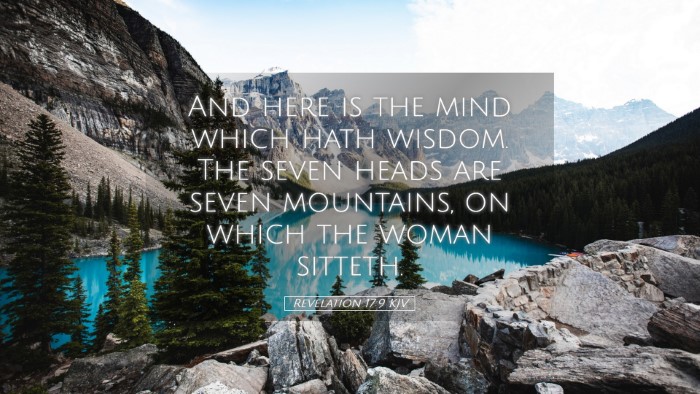Commentary on Revelation 17:9
Revelation 17:9 states: “This calls for a mind with wisdom: the seven heads are seven mountains on which the woman is seated.” This verse is a pivotal point in understanding the symbolism of the visions presented in the Book of Revelation, particularly regarding the identity and significance of the "woman" referred to earlier in the chapter. Below is a summary of insights derived from prominent public domain commentaries.
Historical Context and Symbolism
The imagery of “seven heads” representing “seven mountains” has been subject to extensive interpretation and debate. The number seven frequently symbolizes completeness and perfection in biblical literature, often indicating an authoritative rule or a prominent feature within the narrative. The combination of heads and mountains signifies a fortified power structure—the mountains denoting a strong, established system.
- Matthew Henry posits that the seven mountains may refer to the City of Rome, which is famously built on seven hills. He emphasizes that this geographical reference not only situates the prophecy within a historical context but also underscores the moral and spiritual implications of Rome’s influence over the Christian community during its period of persecution.
- Albert Barnes builds upon this idea, arguing that the seven heads likely represent both actual kingdoms and the broader spiritual ramifications of political powers that are aligned against God’s people. He articulates that understanding these heads requires careful discernment to recognize the manifestations of worldly authority that oppose divine truth.
- Adam Clarke offers a more expansive view of these mountains, suggesting they embody the various powers of the earth that exert dominion over different nations and peoples. Clarke posits that the reference to mountains in biblical literature often serves to signify nations or empires that possess significant influence.
The Woman and Her Significance
The woman seated on the mountains represents not just an individual entity but the collective influence of corrupt systems that arise when the Church compromises its principles or aligns itself with worldly powers. Throughout scripture, the woman often symbolizes various spiritual and ecclesiastical entities. Here, she represents a seduction away from pure devotion to God, encompassing both religious and socio-political corruption.
- Henry warns that the danger lies in the church's susceptibility to being seduced by these worldly influences, leading to a dilution of faith and mission. He challenges believers to maintain discernment in a world rife with ideological and moral corruption.
- Barnes emphasizes that vigilance is crucial for believers, as the allure of such corrupt systems can lead to apostasy. He suggests that the Church must comprehensively examine its alliances and associations to ensure fidelity to its mission.
- Clarke shares insights regarding the universal scope of this warning. He reminds readers that history has shown a pattern of institutions—be they political, religious, or economic—undermining biblical truth when they stray from their foundational tenets.
Call for Wisdom
The phrase “This calls for a mind with wisdom” serves as an imperative call to action for the reader. Such a call is critical for understanding the deeper spiritual implications contained within the text. This wisdom is not merely intellectual but rather discernment driven by the Holy Spirit, allowing believers to interpret the turbulent times they live in.
- Matthew Henry notes that the acquisition of wisdom in this context involves recognizing the true nature of spiritual conflicts and the realities underlying worldly systems.
- Albert Barnes elaborates that wisdom here involves not only the ability to understand the prophetic message but also the courage to act upon that understanding in a way that is faithful to God’s truth.
- Adam Clarke highlights the need for sustained vigilance and spiritual awareness to navigate through complexities posed by the world's moral landscape and to avoid falling prey to its enticing allure.
Theological Implications
This verse points to a profound theological reality regarding the coexistence of divine sovereignty and human rebellion. It reinforces the belief that, while earthly powers may appear strong, they are ultimately subject to God's will and purpose. Thus, the admonition to seek wisdom serves as both a protective measure and an encouragement to remain steadfast in faith.
- Henry concludes that the faithful must approach God with humility, recognizing that true power and authority rest with Him alone.
- Barnes stresses that believers have a duty to actively discern the times, recognizing that the world’s structures often stand in opposition to divine truth.
- Clarke reiterates that wisdom is the key to resistance against the seductions of corrupt powers, encouraging believers to seek continuously after God’s knowledge and guidance.
Conclusion
Revelation 17:9 invites readers to consider the intersection of their faith with the realities of the world around them. It is a call to discernment in times of spiritual warfare, challenging Christians to stand firm against the seductions of corrupt powers while holding fast to the truth of the Gospel. By seeking wisdom through the Holy Spirit, believers can navigate their faith journey effectively amidst the ‘mountains’ of influence surrounding them.


